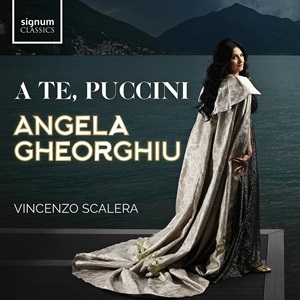
Giacomo Puccini (1858-1924)
A te, Puccini
Angela Gheorghiu (soprano)
Vincenzo Scalera (piano)
rec. 2023, St John’s Upper Norwood, Sylvan Road, London
Reviewed as download from press preview
Sung texts with English translations enclosed
Signum Classics SIGCD780 [50]
The songs of Puccini are still relatively rarely heard and recorded, and perhaps their greatest value is as sources for his operas. Many of his themes are repeated, both in his early operas but also in the late La rondine. Tenor Charles Castronovo recently recorded the lot with newly written arrangements for orchestra, which were very Puccinian, and their relationship to his operas was enhanced. The present recording is, on the other hand, more traditional, performed with Puccini’s original piano accompaniments – and in one instance, Salve Regina, with organ, reminding us that Puccini in his youth earned his living as an organist. Like Castronovo, Angela Gheorghiu sings them in chronological order, which lets us follow the composer’s development from the early A te, written when he was seventeen, to Inno a Roma, composed in 1919 as a celebration of the end of WWI. As an encore we are then taken backwards to 1883, with the recently found Melanconia, which here gets its first recording. It was premiered just a year or so ago by Angela Gheorghiu.
As has been her hallmark throughout her career, which has lasted for thirty years, she is very careful with nuances, and she can still spin a thin thread of legato that is magical. Unfortunately, there is now a fly in the ointment, that has hitherto been absent from her vocal armoury: a disturbing vibrato on high notes – and even not-so-high notes – particularly at forte. I haven’t heard her since her recital Plaisir d’amour (review), recorded five years earlier. Then she was in perfect shape, but five years is a long time in the life of a singer past fifty, and we have to be grateful for her taste and sensitivity, which are intact. The attitude towards vibrato is complicated. Some people are very tolerant and can stomach a very generous vibrato, while others wince at even moderate vibrations. My wife belongs to the latter category, while I am more tolerant. But there are several instances here, where Ms Gheorghiu’s tone becomes shrill and distorted and oversteps my comfort zone. Readers who suspect that they have a somewhat limited comfort zone, like mine, are advised to sample before buying. If they find that the singing is not their cup of tea, I warmly recommend them to try Castronovo instead. They will miss Melanconia, which is an attractive find but hardly a revelation.
And those who must have a soprano? A straight tip is: wait and see. There might during this anniversary year pop up another competitor. Another, more realistic tip is: search out a Naxos disc, issued some seven years ago with dramatic soprano Krassimira Stoyanova (review), who is subtle enough to make even the most lyrical of the songs tell. Moreover, beyond the sixteen songs that belong to the canon, she sings three more pieces, two of them duets, in which she sings the mezzo part as well.
Diehard admirers of Angela Gheorghiu will of course want the Signum disc, and I am sure I will return to some of the songs for the subtlety of her readings. But a general recommendation is: go for Charles Castronovo’s eminent disc with orchestral accompaniment, which also contains three quite substantial orchestral pieces for good measure.
Göran Forsling
Help us financially by purchasing from



Contents
1 A te (c. 1875) Text: anon. 4.10
2 Salve Regina (c. 1882) Text: Antonio Ghislanzoni 5.58
3 Storiella d’amore (1883) Text: Antonio Ghislanzoni 5.23
4 Ad una morta (1883) Text: Antonio Ghislanzoni 3.31
5 Mentia l’avviso (c.1883) Text: Felice Romani 5.21
6 Sole e amore (1888) Text: anon. 2.12
7 Avanti, Urania! (1896) Text: Renato Fucini 1.33
8 Inno a Diana (1897) Text: Carlo Abeniacar 2.23
9 E l’uccellino (1899) Text: Renato Fucini 1.37
10 Terra e mare (1902) Text: Enrico Panzacchi 1.41
11 Canto d’anime (1904) Text: Luigi Illica 1.43
12 Dios y Patria (1905, Buenos Aires) Text: Matías Calandrelli 2.17
13 Casa mia, casa mia (1908) Text: anon. 0.50
14 Sogno d’or (1912) Text: Carlo Marsili 1.29
15 Inno a Roma (1919) Text: Fausto Salvatori 3.35
16 Morire? (1917) Text: Giuseppe Adami 2.56
17 Melanconia (World Premiere) (1883) Text: Antonio Ghislanzoni 3.45

















